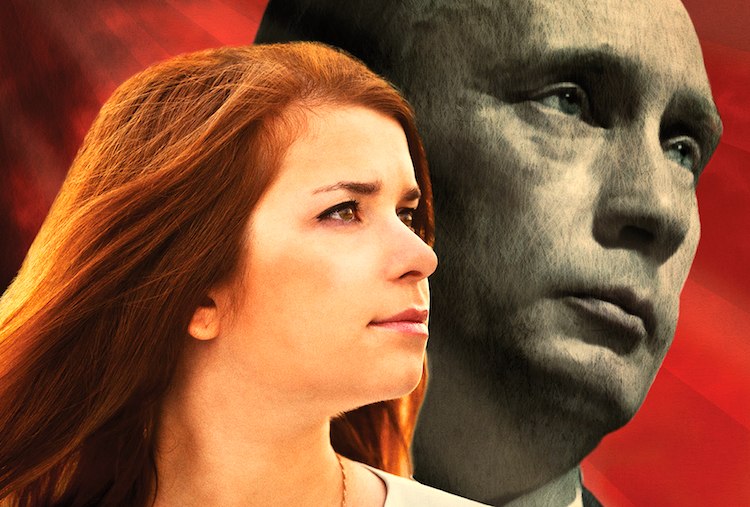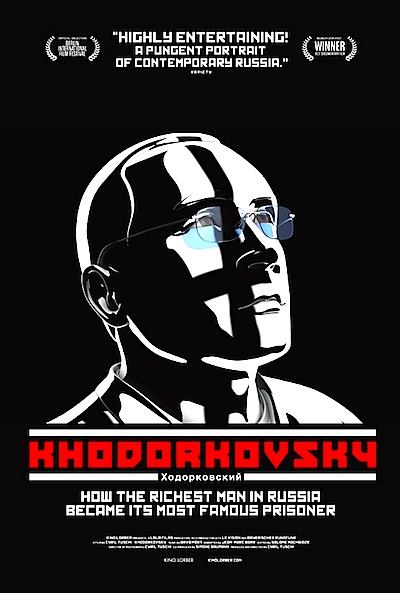
[Editor’s Note: The article below appears in its entirety today at The Atlantic.]
Putin’s Kiss, Khodorkovsky, and Target question tyranny, capitalism, and their country’s future.
By Govindini Murty & Jason Apuzzo. As Russians head toward their presidential elections on March 4th, a trio of new films sheds light on a contemporary Russia veering between hope and cynicism, democracy and authoritarianism. The documentary Putin’s Kiss depicts a young Russian woman who becomes disillusioned with her role as a leader in Vladimir Putin’s nationalistic youth group Nashi in the wake of a brutal beating of a journalist. The chilling documentary Khodorkovsky examines the fate of the jailed Russian billionaire turned democracy activist Mikhail Khodorkovsky. And the science-fiction epic Target depicts the moral collapse of a wealthy elite in an authoritarian, near-future Russia.
On the brink of what may be another six years under Putin’s rule, these three films reveal a deep anxiety about Russia’s future—and a faint glimmer of hope for more genuine democratic freedom.
 Masha Drokova is the young heroine of Danish director Lise Birk Pedersen’s documentary Putin’s Kiss (2012), a selection of the 2012 Sundance and Berlin Film Festivals and currently playing in limited release. Born in 1989, Masha is part of the first generation to grow up in the wake of the collapse of the Soviet Union. At the age of 16, Masha joins Putin’s nationalistic youth group Nashi; by age 19, she is already a spokesperson and leading commissar of the youth group, and Putin himself awards her a medal of honor. By age 21, the bright, ambitious Masha has everything thanks to Nashi: a prestigious spot in a top Moscow university, a new car, an apartment, her own TV talk show, and access to the highest echelons of Russia’s power elite.
Masha Drokova is the young heroine of Danish director Lise Birk Pedersen’s documentary Putin’s Kiss (2012), a selection of the 2012 Sundance and Berlin Film Festivals and currently playing in limited release. Born in 1989, Masha is part of the first generation to grow up in the wake of the collapse of the Soviet Union. At the age of 16, Masha joins Putin’s nationalistic youth group Nashi; by age 19, she is already a spokesperson and leading commissar of the youth group, and Putin himself awards her a medal of honor. By age 21, the bright, ambitious Masha has everything thanks to Nashi: a prestigious spot in a top Moscow university, a new car, an apartment, her own TV talk show, and access to the highest echelons of Russia’s power elite.
As briefly mentioned in the film, Nashi itself was founded in 2005 by Putin supporters to counter the rise of pro-democracy youth groups in the wake of the Ukrainian Orange revolution. Although purportedly “democratic and anti-fascist,” Nashi bears a striking resemblance to the Soviet youth group Komsomol. Like Komsomol, the well-funded Nashi provides a route for many young people into official advancement.
In Putin’s Kiss, Nashi founder Vasily Yakemenko is shown exercising a Svengali-like control over his young charges, exhorting them to discipline and promising them a new life if they will dedicate themselves to Putin and the Russian motherland. As Yakemenko says to the Nashi faithful: “I want everybody to understand: There is no authority for the movement except for the policy of Putin and Medvedev … Being part of the movement means going out into the streets. It means to tell a villain he’s a villain.” As depicted in the film, a major part of Nashi’s efforts are directed toward vilifying Putin’s opponents as “enemies of Russia.” By way of example, the film shows some particularly crude attacks directed at opposition figures Boris Nemtsov, Ilya Yashin, and Garry Kasparov.
Masha is initially drawn to Nashi out of patriotism and ambition. She sees Nashi as a way for young people to get involved in helping advance Russia, and she considers Putin a force for strength and stability. Masha is such a fan of Putin that she becomes known as “the girl who kissed Putin” for impetuously pecking him on the cheek when he presented her with a medal.
Yet Masha’s curiosity about the larger world leads her to make friends with a group of opposition journalists. Masha’s chief friend in the group is the gregarious Oleg Kashin, a liberal journalist who writes for the Kommersant newspaper.
Things take a dark turn one night in 2010 when assailants brutally beat Oleg Kashin …
[For the remainder of this article, please visit The Atlantic.]
Posted on February 29th, 2012 at 11:29am.
Well Pukin stole another election. How the world has changed and not for the better these past thirty years. These films could easily be remade in America for the relevance they display of what I coin “The Great Withdrawal”. The America that no longer looks beyond the Horizon. The America that’s going to stand in line and settle. Brother give me your dime…now!
It’s such a shame. And here we’d thought that the Cold War was actually over …